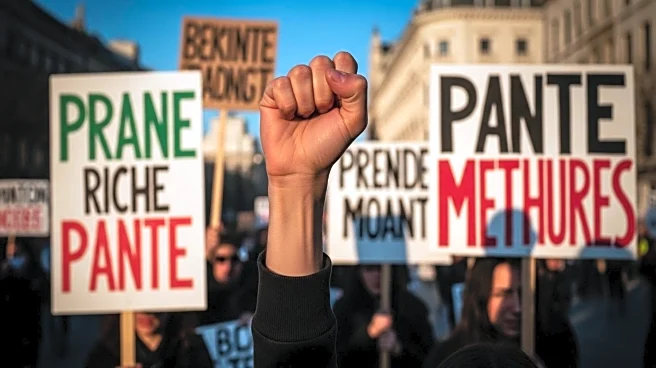What is the story about?
What's Happening?
A Pride march in Belgrade, Serbia, took place on Saturday, condemning police violence against antigovernment protesters and supporting university students leading demonstrations against President Aleksandar Vucic. The event, devoid of festival-like features, included a commemorative silence reflecting the ongoing student-led protests that have persisted for ten months. These protests began following a tragic incident in November when a train station canopy collapse resulted in 16 deaths, sparking allegations of corruption and negligence. The march featured banners with messages such as 'Gays against police state!' and echoed the 'Pump it up!' slogan of the student movement. Organizers criticized frequent police brutality and the jailing of protesters, emphasizing that Pride would not contribute to a facade of normalcy. The protests have faced a crackdown from Vucic, who has dismissed demands for a snap parliamentary election and intensified police actions against demonstrators.
Why It's Important?
The Pride march and ongoing protests highlight significant tensions in Serbia, where President Vucic's increasingly authoritarian measures have drawn widespread criticism. The government's response to the protests, including police violence and the dismissal of educators, underscores a broader struggle for democratic freedoms and human rights in the country. The situation is particularly relevant as Serbia seeks European Union membership, a process that requires adherence to democratic principles and human rights standards. The LGBTQ+ community in Serbia, facing routine harassment, is using the Pride march as a platform to align with broader democratic movements, emphasizing the intersection of LGBTQ+ rights with wider societal issues. The international community, particularly the EU, may view these developments as a test of Serbia's commitment to reform and human rights.
What's Next?
The Serbian government's response to the protests and the Pride march could influence its EU membership aspirations. Continued police violence and authoritarian measures may attract further international scrutiny and pressure. The student-led movement is likely to persist, potentially leading to more significant confrontations with authorities. The LGBTQ+ community's involvement in these protests may also galvanize broader support for human rights in Serbia. Observers will be watching for any shifts in government policy or concessions to protester demands, as well as the potential for increased international diplomatic engagement.
Beyond the Headlines
The events in Serbia reflect a broader global trend where LGBTQ+ rights are intertwined with democratic movements. The Pride march's alignment with antigovernment protests highlights the role of marginalized communities in advocating for systemic change. This situation raises questions about the effectiveness of international pressure in promoting human rights and democratic reforms in countries with authoritarian tendencies. The outcome of these protests could influence similar movements in other regions, setting precedents for how governments and international bodies address such challenges.















